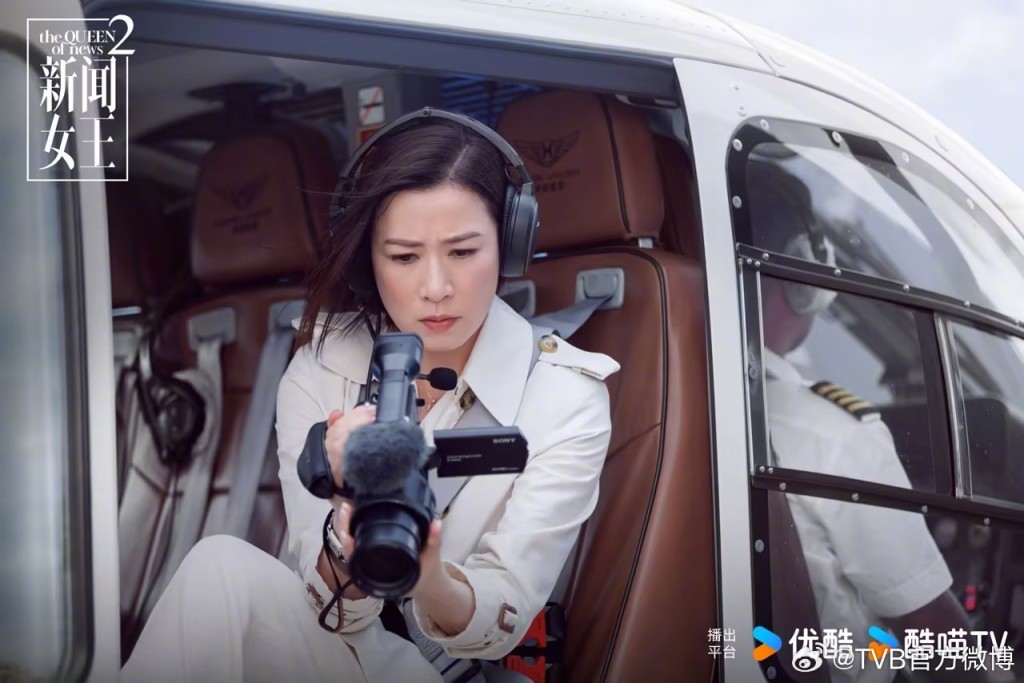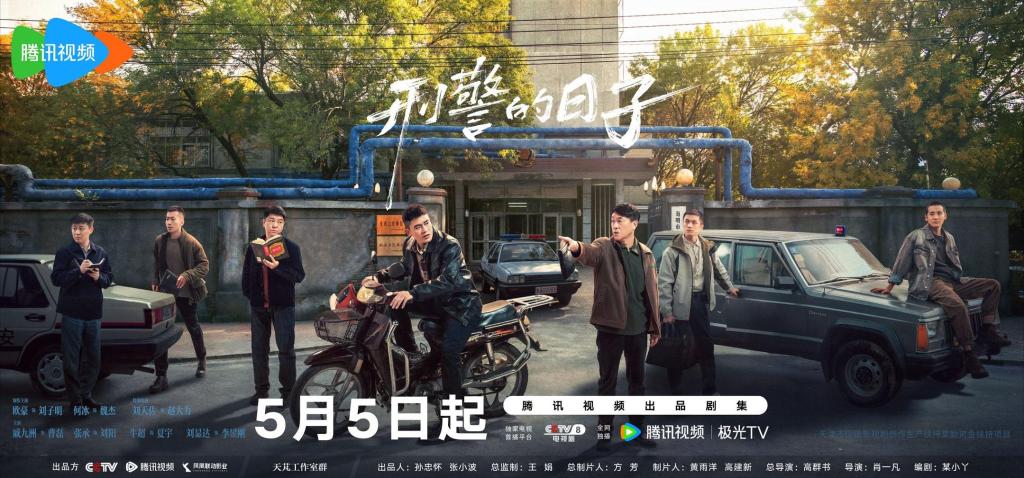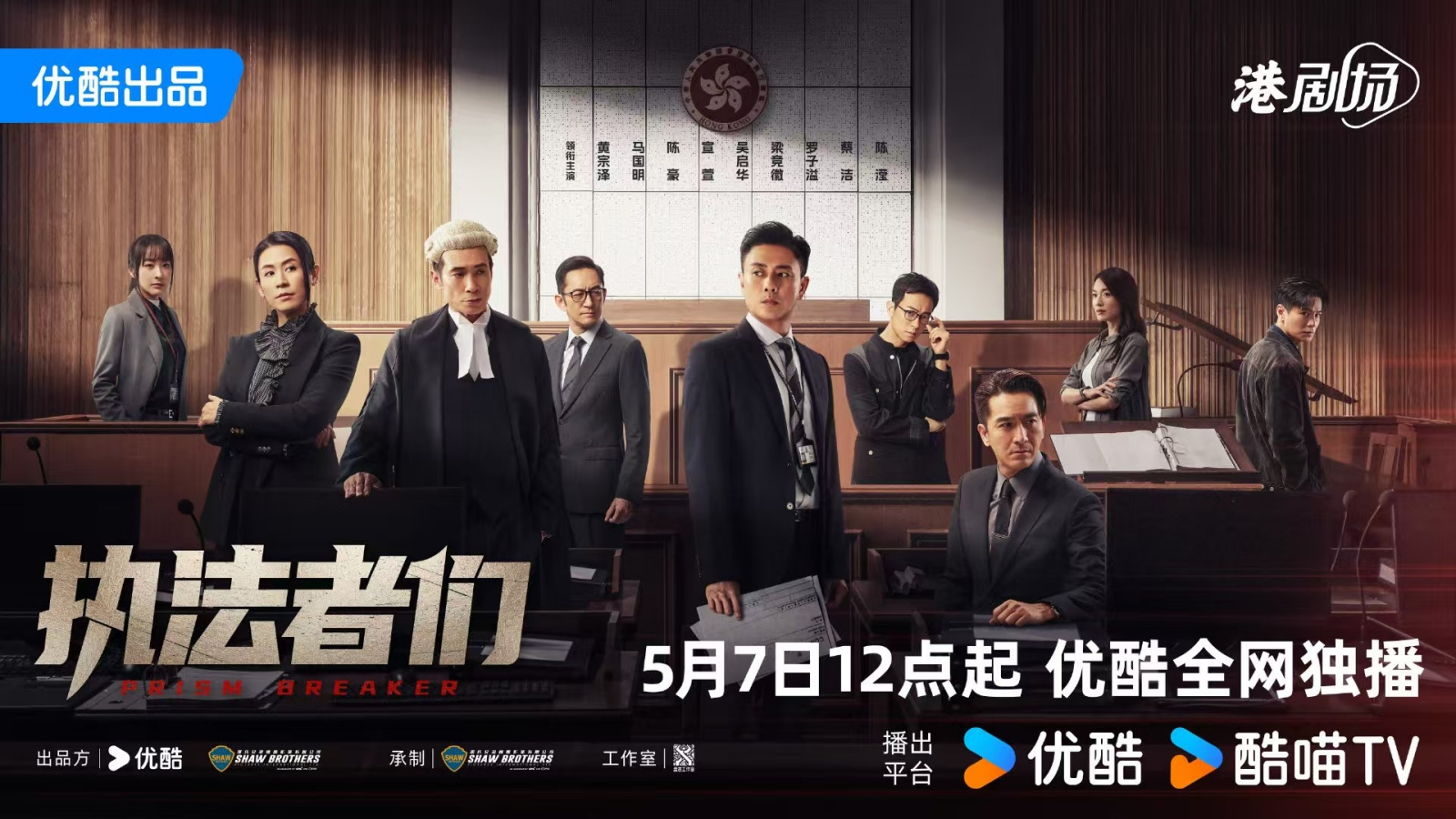
Charmaine Sheh, known as "Man Sister," faces a new rival, Bosco Wong, known as "Kingston." The sequel to the hit IP, "News Queen 2," currently airing on Youku, focuses on a war spanning old and new media between traditional television media SNK and the self-media "open platform."
In an exclusive interview with The Paper, Zhong Shujia, the executive producer of "News Queen 2," discussed the biggest difference in the second season: "In the first season, we focused on internal company struggles, but that didn't satisfy our original intention in creating 'News Queen.' In the second season, we wanted to broaden our subject matter, bringing up the conflict between the self-media ecosystem and the survival space of traditional media." Regarding how to strike a balance between journalistic ethics and the pursuit of traffic, Zhong Shujia stated frankly that upholding ethical standards is crucial to combating some unethical self-media outlets.

Charmaine Sheh plays Wen Huixin
When discussing workplace infighting and bullying in the drama, Chung Shu-kai said, "Because of gender differences, some people like to make jokes about female colleagues, even to the point of sexual harassment. The more you ignore it, the more it will keep happening and eventually become more and more serious, so we wrote this workplace reality into the story. In the drama, it goes a step further, with Gu Zhaohua asking female employee Zhang Jiayan to help him 'shift the blame'."
The recently deceased Hong Kong veteran actor Hui Siu-hung was also a close friend of Chung Shu-kai, and the two had a drama series they were working on yet to air. Unable to see him one last time, Chung Shu-kai couldn't hide his sadness, saying, "He was the best person I've ever met, the best person to his work, to his friends, and to his juniors." He added, "If you could get to know him in person, you would like him even more. Just having a meal with him, having a chat with him, you would know how lovely and precious this senior was."

Chung Shu-kai
【dialogue】
Guide the industry to places with real credibility.
The Paper : The AI anchor is the first breakthrough point of the second season. How did you come up with the idea of starting from this point?
Zhong Shujia : This is the first time the media has asked me about AI anchors. Two years ago, when we were working on the script for the first season of "News Queen," we created two storylines. One was the one that viewers have already seen in the first season, which was entirely set in traditional media. The other storyline was closer to the real news environment in 2022, which is the storyline for the second season. At that time, many people had already started discussing AI, such as news stories about AI replacing your voice.
We were wondering back then if AI news anchors would appear in the future, and what kind of story it would be if an AI version of Wen Huixin came out to compete with her. It was quite a coincidence that when we were filming the second season, real AI news anchors had already appeared, so it was only natural that they would appear in the storyline.
The Paper : From the internal strife within the TV station in the first season to the three-way struggle between the old and new media and the Government Information Office in the second season, what are your insights into filming this?
Chung Shu-Chia : In the first season, we focused on internal company struggles, but that didn't satisfy our original intention in creating "News Queen." In the second season, we wanted to broaden our scope, so we brought up the conflict between the self-media ecosystem and the survival space of traditional media. Traditional media faces some operational pressures, while the chaos of self-media doesn't necessarily guarantee sufficient credibility. We wanted to portray this situation.
At the end of the first season, we wrote that Xu Shiqing was going to work for the Government Information Department. If we want to truly discuss the entire Hong Kong news ecosystem fairly, we should consider all three aspects. Therefore, I created the character of Man Jie, who develops the most credible self-media platform she envisions, so that we can contrast it with some unscrupulous self-media and see how deeply harmful they can be. Zhang Jiayan faces the pressure of operating within traditional media. She once thought that as long as she had power, she could defend the news she wanted to report, but when she actually sat in Man Jie's position, she realized that there are always difficulties; it's just "moving from one prison to another." Bosco Wong's character, the news director, represents the operational pressure faced by traditional media, and how to balance the independence and credibility of news after the entry of commercial capital. These three aspects constitute our modern news ecosystem, and we want to do more and say more.

"Changing jobs is just like changing prisons. Every place is a prison, there's no difference."
The Paper : How do you view the balance between maintaining journalistic ethics and competing for traffic among news media?
Zhong Shujia : Journalists themselves need to maintain a proper balance. In our drama, Wen Huixin, Zhang Jiayan, and Liu Yan all use their professionalism to maintain this balance. As long as it's true, they'll report it. There's only one truth in journalism, and these are their professional ethical standards. They must uphold moral principles to combat some unscrupulous self-media outlets. For example, Tang Zhiyao in our drama represents some unscrupulous self-media outlets that, in order to achieve their traffic goals, resort to any means to produce more incorrect reports, or only report a small part of the facts, in order to steer public opinion towards a level that prioritizes their personal interests. Traditional media and self-media with journalistic conscience need to guide the entire industry towards a truly credible platform.
Only by being reborn from the ashes can one become a hero who defeats the dragon.
The Paper : What are your thoughts on Man's growth storyline in the second season, and what are the reasons behind her becoming "Queen"?
Chung Shu-Chia : She truly became the Wen Hui-Hsin she is today because of her unhappy childhood experiences. Every hero, before becoming a true warrior, must endure countless hardships. Only by surviving these hardships can one become an absolute hero, capable of slaying dragons. Wen Hui-Hsin is no exception. In fact, everyone is the same. No matter what you've experienced, what childhood memories you have, or what shadows you've cast, the key is to face and overcome them yourself. Only then can you achieve true growth.
The Paper : What was the purpose of adding the character Kingston? Why was Bosco Wong chosen to play the role?
Chung Shu-Chia : Kingston represents commercial capital. When commercial capital invests a lot of money in the news industry, can the news continue to be fair and impartial? This is a very real problem. Whether you run a newspaper, a TV station, or a news channel, how do you balance your advertising revenue with your credible reporting? This is a problem that every news channel in the world faces.
The reason for casting Bosco to play such a despicable character is simple: casting the most handsome person would make the audience feel better and less disgusted with him.

Bosco Wong as Kingston Koo Chiu-wah
The Paper : He also had some memorable moments this time, such as talking about "handbags" with Fotile.
Chung Shu-Chia : In the first season, we also wrote a scene where Fotile used different bags to represent each of her employees, which reflected her values towards her subordinates. This season, times have changed, and the pressures SNK faces have also changed, so we wrote another scene on the "bag theory," since you don't need to carry a bag when you go out now.
The Paper : This time, there is a female perspective from the mainland who came to Hong Kong to work hard, which is very special. How did you come up with that idea?
Chung Shu-kai : This character was already in the first draft of the script, but we wrote Liu Yan for the first season. The reason why her name sounds a bit mainland is because we originally envisioned her as a journalist who came to Hong Kong from the mainland to study and develop her career. However, in the actual filming, we didn't use her character; she was actually born and raised in Hong Kong.
In the second season, we wanted to put the original setting back because it's very realistic. There are many people in Hong Kong who come from the mainland to study at university and then stay in Hong Kong to work after graduation. This includes people on my own team, and even two of the writers are like that.
The Paper : What is the most crucial selection criterion when choosing news events?
Chung Shu-kai : Our selection criteria for news stories is to find prototypes in real news stories as much as possible. For example, the first news story about a building collapse was the 2010 To Kwa Wan building collapse. We focused on the entire operation in the news report, including the angles from which the footage was shot. Of course, we made some technical adjustments, but we wanted to recreate the basic elements, including the cause of the collapse and the details, as accurately as possible in the real news reports. This would make the footage feel more authentic.
The Paper : There are also once-in-a-century rainstorms.
Chung Shu-kai : A once-in-500-year rainstorm has occurred in Hong Kong, flooding our underground shopping malls and even the lowest platform of the subway station. Our current explanation for the floods is partly the same as the government's investigation report from that time; only in this way can it be reasonable. We can't just imagine a news story; we must ensure its authenticity and plausibility.
The Paper : What are your thoughts on the workplace infighting depicted in the drama? Organizations like the Equal Opportunities Commission are not commonly seen in previous co-productions. Having a woman go to the Equal Opportunities Commission to whitewash inappropriate remarks by a man creates a lot of dramatic tension.
Chung Shu-kai : Institutions like the Equal Opportunities Commission and the Government Information Services have rarely been featured in Hong Kong dramas before; this seems to be the first time.
In the workplace, gender discrimination and workplace bullying are rampant. Because of gender differences, some people like to make jokes about female colleagues, even to the point of sexual harassment. In Chinese society, many working women may be relatively conservative and may not necessarily stand up to complain or defend their rights. But the more you ignore it, the more it will continue to happen and eventually become more serious. So we've included this workplace reality in our story. The drama goes a step further, with Gu Zhaohua asking his female employee Zhang Jiayan to help him "shift the blame." Asking a female colleague to lie and shift the responsibility onto a deceased colleague is the most shameless way to handle things.
The Paper : Can you talk about the important underlying plot of George's (Kenneth Ma) death? I originally thought it would be revealed at the end, but it came out in the middle.
Chung Shu-Chia : Yes, because there's an even bigger twist in the finale, but I can't spoil it, hahaha. George's storyline, including the once-in-five-hundred-years rainstorm, was originally planned as a movie, but we ran out of time, and I couldn't manage to make it, so we put that part in the second season. This way, the four girls, each with their own agendas, will be able to unite after such a blow.

Kenneth Ma as Leung King-yan
The Paper : What is your favorite line from the show?
Chung Shu-Chia : My favorite line is from the first episode, when Zhang Jia-Yan says, "What you see is just a perspective, not the facts; what others see is just an opinion, not the truth." This line is the theme that runs through our entire drama. In this day and age, when the media wants to confirm something, it often requires verification from multiple sources, rather than just a single viewpoint. It requires a balance from multiple perspectives.
We've developed a habit of checking our phones first thing every morning when we wake up. The news that pops up isn't always from reputable platforms, so how do you verify its authenticity and timeliness? This is a downside of the prevalence of social media these days, because you can't always easily believe something is true.
The Paper : It is at this time that the importance of authoritative media can be highlighted.
Chung Shu-kai : That's right, that's what I was trying to say. Authoritative traditional media, media with credibility, have their value. Just like TVB, whenever there's a typhoon in Hong Kong, our typhoon weather reports are watched by all viewers. That's its unique credibility.
The Paper : What's your take on the balance between realism and idealism in this drama?
Chung Shu-Chia : We must always have ideals. Without ideals, there will be no dreams; without dreams, you won't have goals to pursue. But we also need to understand the reality. Reality requires you to make more balances so that your ideals and dreams can become reality. Leaning towards either side will not achieve your ultimate goal, so you must achieve a good balance.
If you could meet Hui Siu-hung in person, you would like him even more.
The Paper : "Golden supporting actor" Hui Siu-hung recently passed away. His posthumous work includes "The Goddess of Justice," which you directed. Talk about your collaboration with him.
Zhong Shujia : Oh, Professor Xu was a very good senior and a very good friend of mine. It's truly a pity. I had to board a plane on the day this happened, and I couldn't make it to see him one last time. I feel really bad about it. Having known him for so many years, he was the kindest person I've ever met—the kindest person to his work, to his friends, and to his juniors. Honestly, I don't know what to say. I hope his family can recover from their grief as soon as possible.
His performance in "Justice" was excellent, excellent, excellent. I was also working on the script for "Justice 2," and losing him was truly a pity.
The Paper : I quite liked him after watching "Line Walker" and "New Police Story".
Chung Shu-Chia : If you could get to know him in person, you would like him even more. Once you've had a meal with him and chatted with him, you'll know how lovely and valuable this senior is.

Photo of Hui Siu-hung at the wrap party for "Goddess of Justice"
The Paper : In recent years, many of your works, such as the "Queen of News" series and "Goddess of Justice," have featured women as the central figures. Could you talk about the considerations behind this choice?
Chung Shu-Chia : I've always felt that there's still a lot of room for development in women's themes, and many stories to tell. Women of different ages are our main audience. And women all have it tough, whether they choose to strive in the workplace or dedicate themselves to their families. In fact, every woman exists independently and has her own greatness.
I believe that what makes a woman truly outstanding is not the magnitude of her achievements, but rather that every choice she makes is for herself. I hope that every woman can make choices for herself, not for the sake of her family or any other reason that forces her to make those choices.


